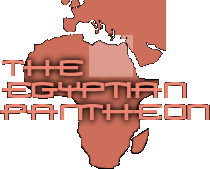 |
|
|
 |
| The
ancient Egyptians worshipped many gods. These gods and goddesses
often represented the natural world, for example the sky,
earth, wind, or sun. They |
 |
| took
the form of animals or combined animal
and human forms. Egyptian gods had a life
that closely resembled human life; they
lived, died, hunted, went into battle, gave birth, ate, drank,
and had human emotions. The
importance of the various gods and goddesses changed over
time |
|
|
| and
depended on the beliefs
of the king in power. Certain gods were worshipped in different areas.
|
 |
 |
AMUN-RA
(or-Re) was a combination of Amun and Re from later Egyptian mythology,
also called Amon-Ra. The Theban god Amun became the national god
of Egypt under this name. |
 |
ANUBIS
(Anepo) was an ancient Egyptian god. He was the son of Osiris
and Isis. He was described as having the head of a jackal. He guided
the souls of the dead from this world into the next. He was also
a sort of judge of the underworld since he weighed the actions of
the dead ones in the presence of Osiris. |
 |
ATUM
was the god that created himself. He was represented in the form
of a human and a serpent. |
 |
BA
was the god of fertility and childbirth. |
 |
HATOR
was the goddess of love, beauty and dance. |
 |
HORUS
was the earliest royal god and had the shape of a falcon,
with the sun and moon as his eyes. The sky-god was the ruler of
the day. |
 |
ISIS
was one of the most popular goddesses in Egypt. She was regarded
as the mother and protector of the pharaohs. She was worshipped
as the divine mother-goddess, and was the dedicated mother of Horus.
|
|
 |
 |
NUT
was the Egyptian sky-goddess. She was the personification
of the sky and of the heavens, the daughter of Shu and Tefnut. Nut
was the barrier separating the forces of chaos from the ordered
cosmos in this world. She swallowed the stars and gave birth to
them later. In the death cult she plays an important role in the
resurrection of the dead; she is portrayed on the inside of the
lids of the sarcophagi. As sky-goddess Nut was portrayed as a naked
woman covered with painted stars, held up by Shu. Thus she formed
the firmament above her husband Geb, the earth. Her fingers and
toes were believed to touch the four directions. |
 |
MAAT
was the goddess of truth and world order. "Maat" was also a general
term for the law and order under which the Egyptians lived. |
 |
MENTHU
was the god of war. |
 |
NEPHTHYS
was the goddess who protected the dead. She was the daughter
of Geb and Nut and later was married to Seth. |
 |
OSIRIS
was the god of goodness and justice. He was married to Isis, a sky
goddess. He was also the protector of the dead. |
 |
PTAH
was the creator-god of Memphis, the city that served as the capital
of ancient Egypt for most of its history. Ptah was depicted as a
mummified man with only his hands free to hold a scepter composed
of the symbols of life, power, and stability. |
|
 |
 |
RA
was the ancient Egyptian Sun god and Lord of the sky. In
some versions of the Egyptian creation he created the universe.
|
 |
SETH
was the god of evil. He is also a god of war, deserts, storms
and foreign lands. As the god of the desert he protected the caravans
which traveled through the desert, but he also caused great sandstorms
which destroyed them. This brought him into conflict with the fertility
god Osiris. |
 |
SHU
was the son of Atum and the brother of Tefnut. He and Tefnut
created the twins Geb and Nut. Shu then separated the twins, leaving
Geb to float in the primordial ocean and Nut to remain high above
the earth as a pathway for the Sun to travel each day from horizon
to horizon. |
 |
SPHINX
was a goddess of wisdom and knowledge. |
 |
GEB
(SEB) was the earth god. He was masculine, contrasting with
the tradition that the god of the earth was usually female. |
 |
TEFNUT
was the personified goddess of moisture in Egyptian mythology. She
became the mother of Geb (Earth) and Nut (Sky). |
 |
THOTH
was the god of wisdom. |
|
 |
 |
|
|
| "The
Big Myth" © Distant Train 2002 |